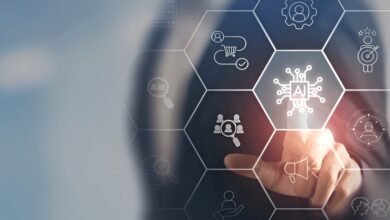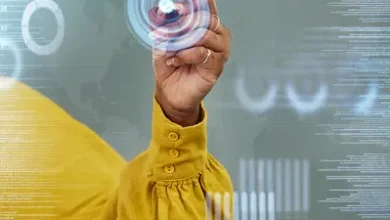How IoT in Healthcare is Revolutionizing the Medical Industry in Germany

The world of healthcare in Germany is undergoing a transformative journey, thanks to the integration of the Internet of Things (IoT). This technological revolution is reshaping traditional medical practices and enhancing the overall healthcare experience.
In essence, IoT in healthcare is not merely a technological addition; it represents a paradigm shift towards a more advanced, efficient, and patient-centric healthcare system. The ongoing evolution in this field promises a future where healthcare is not only technologically driven but also ethically grounded, ensuring a holistic approach to the well-being of individuals in Germany and beyond.
In this article, we’ll explore in detail how IoT is making waves in the German medical industry.
Read More: 15 Best IoT Trends in Germany in 2024
Introduction
A. Definition of IoT in Healthcare
The Internet of Things in healthcare refers to the interconnection of medical devices, databases, and healthcare systems through the Internet. It enables the seamless exchange of information, leading to improved patient care and operational efficiency.
B. Importance of IoT in the Medical Industry
As the healthcare landscape evolves, the significance of IoT becomes evident. From remote patient monitoring to smart medical devices, IoT has the potential to revolutionize the way healthcare is delivered and managed.
IoT Applications in German Healthcare
A. Remote Patient Monitoring
One of the key applications of IoT in German healthcare is remote patient monitoring. Through wearable devices and sensors, healthcare providers can track patients’ vital signs in real-time, allowing for proactive interventions and personalized care.
B. Smart Medical Devices
IoT has paved the way for the development of smart medical devices that can autonomously collect and transmit patient data. These devices range from insulin pumps to pacemakers, contributing to more precise diagnostics and treatment.
C. Data Analytics for Treatment Insights
The integration of IoT enables healthcare professionals to analyze vast amounts of data, leading to valuable treatment insights. This data-driven approach helps in identifying patterns, predicting disease outbreaks, and optimizing treatment plans.
Advantages of Implementing IoT in Healthcare
A. Enhanced Patient Care
IoT facilitates continuous monitoring, resulting in early detection of health issues and prompt interventions. This leads to improved patient outcomes and a higher quality of care.
B. Efficient Resource Management
The utilization of IoT in healthcare streamlines resource management. From optimizing hospital workflows to predicting equipment maintenance needs, IoT ensures efficient use of resources, ultimately reducing costs.
C. Improved Diagnosis and Treatment
With real-time data access and analytics, healthcare professionals can make more informed decisions regarding diagnosis and treatment plans. This not only accelerates the diagnostic process but also enhances the precision of medical interventions.
Challenges and Solutions
A. Data Security Concerns
The implementation of IoT in healthcare raises concerns about the security of patient data. Robust encryption, regular security audits, and compliance with data protection regulations are crucial in addressing these concerns.
B. Integration Issues
Integrating IoT into existing healthcare systems can be challenging. However, strategic planning, collaboration with technology experts, and phased implementation can mitigate integration challenges.
C. Regulatory Compliance
Adherence to healthcare regulations is paramount. Healthcare providers must navigate through complex regulatory landscapes to ensure that IoT implementations comply with legal and ethical standards.
Success Stories in German Healthcare
A. Case Study 1: Remote Monitoring Success
In a German hospital, the implementation of remote monitoring through IoT devices resulted in a significant reduction in hospital readmissions. Patients with chronic conditions experienced enhanced care, leading to improved health outcomes.
B. Case Study 2: IoT-driven Diagnostics
A diagnostic clinic in Germany embraced IoT-driven diagnostics, improving the speed and accuracy of test results. This not only benefited patients but also streamlined the clinic’s operations.
Future Prospects and Innovations
A. Evolving Technologies in IoT
The future of IoT in German healthcare holds promising advancements, including the integration of artificial intelligence and machine learning. These technologies will further enhance the predictive capabilities of healthcare systems.
B. Potential Impact on Healthcare
As IoT continues to evolve, its potential impact on healthcare includes personalized medicine, early disease detection, and more efficient healthcare delivery. The synergy between IoT and other emerging technologies will shape the future of medical practices.
Patient Perspectives on IoT
A. Patient Experience with IoT-enabled Healthcare
Feedback from patients using IoT-enabled healthcare solutions highlights increased engagement and a sense of empowerment. Patients appreciate the convenience and personalized nature of IoT-driven healthcare.
B. Acceptance and Concerns
While acceptance of IoT in healthcare is growing, there are concerns regarding privacy and data security. Addressing these concerns through transparent communication and robust security measures is essential.
Role of Healthcare Professionals
A. Training and Adoption
Healthcare professionals play a pivotal role in the successful implementation of IoT. Adequate training programs and fostering a culture of continuous learning are essential for the seamless adoption of IoT technologies.
B. Empowering Healthcare Providers
IoT empowers healthcare providers by providing them with real-time insights and data-driven decision-making tools. This not only enhances the efficiency of healthcare delivery but also improves overall patient care.
IoT and Pandemic Preparedness
A. Lessons Learned from COVID-19
The COVID-19 pandemic underscored the importance of technology in healthcare. IoT played a crucial role in monitoring patients remotely, tracking the spread of the virus, and optimizing resource allocation.
B. IoT’s Role in Future Pandemics
The lessons learned from the pandemic will shape the integration of IoT in future healthcare strategies. IoT’s role in early detection, contact tracing, and crisis management will be pivotal in addressing future pandemics.
Government Initiatives and Support
A. Funding and Policies Encouraging IoT
The German government recognizes the potential of IoT in healthcare and has implemented policies and funding initiatives to encourage its adoption. This support fosters innovation and technological advancements in the healthcare sector.
B. Collaborations for Technological Advancements
Government-industry collaborations are driving technological advancements in healthcare. Partnerships between healthcare providers, technology companies, and research institutions contribute to the development of cutting-edge IoT solutions.
Overcoming Resistance to Change
A. Addressing Cultural Shifts
Resistance to change is a common challenge in healthcare. Addressing cultural shifts through education, awareness programs, and showcasing successful implementations will facilitate smoother transitions.
B. Building Trust in IoT Solutions
Building trust in IoT solutions requires transparency and accountability. Clear communication about the benefits, risks, and security measures associated with IoT in healthcare is crucial for gaining trust among stakeholders.
Comparison with Traditional Healthcare Systems
A. Efficiency and Cost-effectiveness
IoT-driven healthcare systems demonstrate increased efficiency and cost-effectiveness compared to traditional models. The automation of routine tasks, data-driven decision-making, and reduced manual errors contribute to these advantages.
B. Patient Outcomes and Satisfaction
Patients in IoT-enabled healthcare systems experience better outcomes and higher satisfaction levels. The personalized and proactive nature of care enhances the overall patient experience.
The Ethical Considerations of IoT in Healthcare
A. Privacy and Consent
Privacy is a paramount concern in healthcare. Striking a balance between utilizing patient data for improved care and respecting privacy rights requires robust consent mechanisms and ethical guidelines.
B. Balancing Innovation and Ethics
As healthcare embraces innovation, maintaining ethical standards is crucial. A careful balance between pushing the boundaries of technology and upholding ethical principles ensures responsible and sustainable healthcare practices.
Key Takeaways
A. Recap of IoT’s Impact on German Healthcare
The integration of IoT in the German healthcare system has resulted in enhanced patient care, improved diagnostics, and increased efficiency. The journey towards a technologically advanced healthcare landscape continues.
B. Future Predictions and Trends
Anticipated future trends include the proliferation of wearable devices, increased use of telemedicine, and the integration of IoT with genomics for personalized medicine. These trends are expected to further shape the healthcare landscape in Germany.
Conclusion
In conclusion, the integration of IoT in healthcare is undeniably revolutionizing the medical industry in Germany. The transformative impact is visible across various facets of healthcare delivery, from enhanced patient care through remote monitoring to the efficiency brought about by smart medical devices. The benefits of improved diagnosis, treatment, and resource management underscore the pivotal role IoT plays in reshaping traditional healthcare practices.
While the journey has not been without its challenges, including data security concerns and integration issues, the success stories and advancements showcased in this article highlight the significant strides taken in overcoming these obstacles. The collaborative efforts of healthcare professionals, government support, and innovative technological solutions have propelled Germany towards a future where healthcare is not just a reactive process but a proactive and personalized experience.
As we navigate the complexities of ethical considerations and work towards building trust in IoT solutions, it is evident that the future holds even more promising prospects. Anticipated trends such as the proliferation of wearable devices, increased use of telemedicine, and the integration of IoT with genomics are poised to further elevate the standards of healthcare in Germany.












One Comment